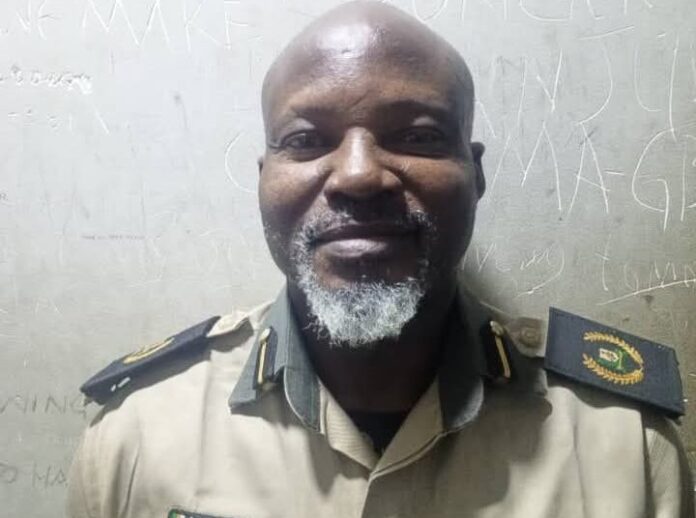In a chilling turn of events, Yomi Adetula, a prominent official with the Ogun State So-Safe Corps, was brutally murdered by gunmen in broad daylight. The killing took place inside a church in Idi-Iroko, a town in the Ipokia Local Government Area of Ogun State, early on Sunday morning. Adetula, who was the Director of Anti-Arms Smuggling, was reportedly preparing for a religious service when the attackers struck.
Witnesses say the gunmen arrived just after 10 a.m., storming into the church with weapons drawn. “They shot him, but the bullets did not penetrate,” said a resident of Idi-Iroko who witnessed the attack. “They then attacked him with other weapons, including a hammer and machete. It was clear these men were hired assassins, their mission precise and deadly.”
Adetula’s body was discovered disfigured, with gruesome injuries visible on his face and torso, reportedly from the gunshots and violent assault. His death has raised alarm across Ogun State, not only due to its brutal nature but also because of his involvement in a high-profile legal case.
Adetula was listed as a key witness in the libel lawsuit filed by IBD Dende, a prominent figure at the center of an explosive investigation conducted by the Foundation for Investigative Journalism (FIJ). The investigation had exposed alleged smuggling activities, with Dende’s name appearing in a controversial report that garnered widespread attention. Dende’s response was a lawsuit against FIJ, claiming defamation, with Adetula slated to testify as a crucial witness against him.
The connection between Adetula’s death and his role in the case has not gone unnoticed. Several commentators, including renowned Nigerian journalist Fisayo Soyombo, have speculated that Adetula’s murder could be linked to his involvement in the investigation. Soyombo’s investigation, which exposed illegal arms trade and smuggling, had targeted key figures in Nigeria’s underground economy, and Adetula’s testimony was seen as vital in building a case against these criminals.
“This is a clear act of intimidation,” said Soyombo. “Adetula was not just a key witness in a legal case; he was someone standing against powerful individuals with immense resources. His death sends a chilling message to others who might be willing to speak out.”
The attack, carried out with precision and cold brutality, has left many questioning the safety of those who dare to challenge the status quo. Locals in Idi-Iroko expressed disbelief at the audacity of the murder, especially considering it took place inside a place of worship, a place of sanctuary for many. “It is unimaginable,” another resident remarked. “People are now afraid to even step out of their homes, not knowing who could be next.”
Local authorities have vowed to launch a full investigation into the murder, though the circumstances surrounding the attack remain unclear. The Ogun State Police Command has yet to release a statement on the incident, but sources close to the investigation suggest that the police are exploring the possibility that Adetula’s death may be linked to his involvement in the smuggling and libel case.
“The police are on the case, but I am not sure how far they will go in solving it,” one source confided. “In situations like this, the truth often gets buried under political pressure and corruption.”
Adetula’s murder is not an isolated incident in a country where violence and lawlessness have become widespread, especially in regions where smuggling and other illicit activities are rampant. Many Nigerians have pointed out that smuggling rings and criminal cartels wield enormous influence and are capable of silencing anyone who stands in their way, including law enforcement officers, journalists, and whistleblowers.
A source close to the investigation hinted that the murder might be a retaliatory act against Adetula for his role in exposing the underworld network involved in arms smuggling. This comes at a time when the Nigerian government has made concerted efforts to tackle illegal arms trade and combat insecurity in the country. However, critics argue that the government’s efforts are hindered by the entrenched power structures that allow criminal networks to thrive.
One commenter on social media wrote, “When you go after smugglers, be prepared for the worst. They are no different from armed robbers, and the system seems to protect them rather than the people trying to stop them.”
The chilling nature of the attack has sparked outrage, with Nigerians expressing deep concerns about the rule of law and the safety of those who fight for justice. “It is heart-wrenching,” said a human rights activist. “We live in a country where those who uphold the law are often targeted and silenced. The system is failing, and this tragedy is just another example of how dangerous it can be to stand up against powerful criminal forces.”
While some speculate that the murder could be linked to Adetula’s witness testimony in the libel case, others suggest that his work combating smuggling and arms trafficking may have put him on the radar of those involved in the illegal trade. “Smugglers are ruthless, and they have no qualms about eliminating anyone who threatens their business,” said a law enforcement officer familiar with the case. “Adetula was a significant figure in the fight against them.”
Adetula’s death also highlights the dangers faced by individuals working in Nigeria’s security and law enforcement sectors, where corruption and violence are endemic. Over the years, several officers and investigators have met violent ends while investigating or exposing criminal activities, yet few of these cases have been solved.
The murder of Yomi Adetula serves as a stark reminder of the risks faced by those working to uphold the law in Nigeria.

